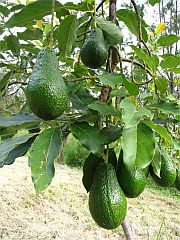Mexico City - The avocado trade between Mexico and the United States will continue with or without the North American Free Trade Agreement (NAFTA), even with a possible application of a tariff, said Ramon Paz Vega.
The strategic adviser of the Association of Producers Packers and Exporters of Avocado from Mexico (APEAM) said that in the end, this eventual tax would be paid by American consumers, because there are no alternatives.
"There is no other country that can supply the US market throughout the year and in the volumes that are required. In the absence of a substitute supplier, we are cautiously optimistic that trade will continue with or without a treaty," he said.
He also said that, currently, 52% of households in the United States consume this product, and that per capita consumption had gone from 500 grams to three and a half kilograms.
 |
"The scenario is to return to a pre-FTA situation, where we paid a six-cent tariff. That would bring along some disruptions, there would be changes in the cost structure which the American consumers would pay in the end because there are no substitutes and it is what the product is worth," he said.
He said that the Mexican avocado value chain also created value for the US economy, as it generated around 19,000 jobs with income of $1,200,000 and had improved the situation of producers in the state of California, among other benefits.
However, he said, he considered that the trilateral trade agreement wouldn't have any changes for this sector, and that they expected exports to grow by 15 percent.
Paz Vega said that last season alone, Mexico had exported 725 thousand tons of avocado to the United States, and that they expected to export 830 thousand tons in this campaign and continue increasing exports in the following years.
One difficulty that the industry has experienced is the expansion of access to other states, so that not only Michoacan can export the product, he said, adding that they were waiting for the US Department of Agriculture to sign the corresponding document.
If this happens, he said, the Ministry of Agriculture, Livestock, Rural Development, Fisheries and Food would select the sites that can export this product to the US taking into account that they are free of plagues and phytosanitary problems. The possible exporting sites are 14 Jalisco municipalities, and 3 in the State of Mexico, among others.
The strategic advisor of the APEAM said that this activity had benefited more than 100,000 Mexican families who have come out of poverty and no longer consider migrating to the United States.
Original elsiglodetorreon.com article translated and edited by freshplaza.com.


